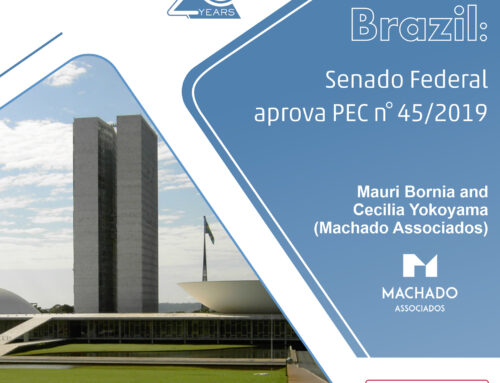Bolivia: FUNDEMPRESA ceases its functions and the administration of the Registry of Commerce returns to the State
On October 1 of this year, the President of Bolivia enacted Law No. 1398 (Law of the Registry of Commerce), which aims to restore the Registry of Commerce to the Ministry of Productive Development and Plural Economy and provides that the creation, organization, operation and financing of the new public institution will be regulated through a Supreme Decree.
On October 6, 2021, Supreme Decree 4596 was issued creating the Plurinational Service for the Registry of Commerce – SEPREC and establishes that FUNDEMPRESA will remain as the administrator of the Registry of Commerce until March 31, 2022.
After 20 years of operation, Fundación para el Desarrollo Empresarial, or FUNDEMPRESA as it was better known in the industry, will cease to manage the Registry of Commerce and such attribution will fall into the hands of the Plurinational Service for the Registry of Commerce – SEPREC. This means that, after the handover of the Registry of Commerce from FUNDEMPRESA to SEPREC, businessmen will no longer work side by side with a private foundation, whose operation has been known for decades, but will start a new relationship with a completely new government body. This change of system will bring new challenges and benefits, in the short and long term, which are explained and discussed below.
Currently, with the enactment of Law No. 1398 (Registry of Commerce Law), dated October 1, 2021, the administration of the Registry of Commerce will return to public administration as of April 2022, under the supervision of the Ministry of Productive Development and Plural Economy. In compliance with the regulation to this law, by means of Supreme Decree 4596 of October 6th, the Plurinational Service for the Registry of Commerce – SEPREC, was created, which will have the faculties that were previously granted to FUNDEMPRESA.
ADVANTAGES AND DISADVANTAGES
By virtue of the commercial regulations in Bolivia, the purpose of the Registry of Commerce is to keep the registration of merchants as well as the registration of all acts, agreements and documents for which the Law requires this formality, in order to grant publicity to such acts.
In addition to the above, by means of Supreme Decree 4596, amongst the attributions granted now to SEPREC, is the power to coordinate the implementation of a Single Registration and Certification System for the integration of economic units, as well as a Geographic Information System of registered and updated companies, which will result in a necessary digitalization of the services that will be provided by the new administrator of the Registry of Commerce.
Likewise, as an additional advantage recently created, SEPREC was given the attribution of coordinating with the Ministries and Public and Private Entities, for the application of the Law of De-Bureaucratization for the Creation and Operation of Economic Units (No. 779 of January 21, 2016). Said law created a virtual digital information system called “Yuriña”, in charge of centralizing the information of economic units, assigning a unique code to each one. Although this system has not been yet applied, it should be implemented with the start of operations of SEPREC and its new coordination attributions.
According to statements announced by the Minister of Productive Development and Plural Economy, Néstor Huanca, SEPREC seeks to optimize the services of the Registry of Commerce, so that the procedures can be carried out virtually, so that it will be possible to incorporate companies immediately. Likewise, the systematization of the business information to be implemented will make it possible to generate statistics and even identify suppliers for different sectors, an aspect that could be very useful, for example, for state purchases.
On the other hand, after decades of operation, the transition from FUNDEMPRESA to SEPREC will undoubtedly involve the transfer of a large amount of data. In principle, it is presumed that this procedure will be carried out in a diligent manner, seeking the preservation of the information in its entirety. However, it is highly recommended that legal entities that are registered before FUNDEMPRESA have their own copy of their documentation and the corresponding backups in their own files. This, in order to avoid inconveniences that could arise due to an error in the transfer of data from one administrator to another.
Likewise, it is important for the users of the Registry of Commerce to consider that the implementation of a new system, technology, and a new institution as such, may require a time to adapt to the new system, not only for the users, but also for the officials. Therefore, it is highly recommended that, as far as possible, the procedures before SEPREC be carried out in advance of the peremptory deadlines that may be applicable, foreseeing a possible delay in the responses.
In short, with the change to the new state administrator of the Commercial Registry, there will be technological and coordination advantages amongst authorities; but it is very likely that there will be an increase in delays and even loss of information, at least in the short term. For this reason, since companies close their fiscal management on a date established by their economic activity, there will be companies that will update their registration in FUNDEMPRESA and others that will do it before the new institution. In such cases, we recommend taking precautions and avoid complying with this obligation on the deadline for the transition.
In Bolivia, the Registry of Commerce was created by the Commercial Code of 1834, which established the obligation to register merchants in the General Merchant Registration Book before the Police Intendant.
At the beginning of the 20th century, by Decree-Law No. 28 of April 1937, the Commercial Registry was created, under the responsibility of the Chamber of Commerce. However, in 1977, with the enactment of a new Commercial Code, the administration of the Commercial Registry was transferred to the Ministry of Industry, Commerce and Tourism and, in 1979, the Registry of Commerce and Joint Stock Companies (RECSA for its acronym in Spanish) was created.
In 2001, through Supreme Decree N°26335 of September 29, 2001, the State granted the administration of the Registry of Commerce to the Foundation for Business Development – FUNDEMPRESA.
Writer: Jorge Luis Inchauste, from Dentons Guevara & Gutierrez
Original: https://www.dentons.com/en/insights/articles/2021/november/11/fundempresa-ceases-its-functions
Image: Pessoas foto criado por aleksandarlittlewolf – br.freepik.com





